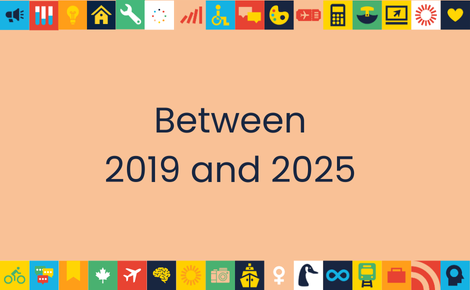Students who travel develop skills in cross-cultural communication and an understanding of different cultural practices. The applications to business, social services, health care and communications are vast.
This op-ed was published in the Ottawa Citizen in November 2021.
Opinion piece by Denise Amyot and Paul Davidson
A peculiarity of staying close to home in these pandemic times is that it’s made the world seem smaller. Alone on our screens, we’ve seen how connected we are as inhabitants of this planet.
We’ve felt the evidence in our own neighbourhoods of global warming and the effects of wildfires thousands of kilometres away. We’ve paid more for food and joined waitlists for electronics triggered by international supply chain issues. And, of course, we’ve watched infection spread from country to country, then cheered on scientist who put their best minds to developing vaccines.
It’s a reminder of our need for global fluency and the imperative of graduating a new workforce that understands the world, a cohort that must include more Indigenous students, more students with disabilities, and more students for whom international experiences have seemed financially out of reach.
As travel restrictions lift, it’s time to reignite and boost plans for studies abroad. Canada needs the worldview of graduates who have experienced life beyond our borders. We’re not alone in recognizing this need. The government of Canada’s 2019-2024 International Education Strategy highlighted the importance of international experiences that offer students exposure to new cultures and ideas.
The Global Skills Opportunity program launched this month is an integral component of this strategy. It creates opportunities for more than 16,000 students from across Canada to travel abroad by 2025 as part of their post-secondary education. Those students will bring back the experiences, perspectives and skills today’s employers look for and that a prosperous economy demands.
In a country of this size, it’s a bit ironic that we don’t travel far for education. In Canada, only 11 per cent of undergraduate university students and three per cent of college students opt to take part of their studies outside our borders. That’s well under the participation rates of our international peers. France sees a rate of 33 per cent and Germany 29 per cent. Lest you think that’s because of the geography of Europe, consider that 19 per cent of Australian students spend part of their academic lives elsewhere and 16 per cent of American students study abroad.
The reasons vary. We know that Canada is a great place to live, and our universities and colleges offer outstanding opportunities. We also know that some students have concerns about costs, transferring credits or missing out on what’s happening at home. Others simply don’t see themselves among the cohorts who travel abroad.
Global Skills Opportunity addresses many of those barriers. It provides extra support for those who are financially disadvantaged, Indigenous students and students with disabilities. Funding might include supports for child care or having an elder accompany students as they travel abroad, for example.
The program also encourages travel to less traditional destinations. We’ve worn a good path to the U.S., France, England and Australia, yet there are tremendous opportunities in Peru, Finland, Japan, Korea and many other countries open to sharing their higher education opportunities.
Students consider their experience abroad to be life-changing. Mahdiyyah Kasmani travelled to Turkey as part of her studies in criminology and human rights and diversity at Laurier University. She said it taught her to be more independent. “It’s important to focus on schoolwork, but a lot of learning happens outside of the classroom.”
Akbar Qaderi was studying criminal justice at Humber College when he travelled to Ogana, Mali. “Getting an idea of different cultures and understanding different values and different beliefs will help you become a better police officer, will help you become a better lawyer or correctional officer, will help you be a better person overall.”
Students who travel develop skills in cross-cultural communication and an understanding of cultural practices. The applications to business, social services, health care and communications are vast. Simply navigating a transit system and buying groceries in another culture teaches students how to adapt. They build international connections that will make them the go-to contact for many workplace applications.
Employers want that. International experience shows employers a candidate is open to new ventures and has life experiences beyond the lecture hall.
In a Leger Marketing study of small and medium enterprises across Canada, 82 per cent of employers said employees who have cross-cultural knowledge and an understanding of the global marketplace enhance their company’s competitiveness. A UK Higher Education International Unit study indicates students with international experiences are more likely to be employed within six months of graduation and earning more than those who stayed home.
The benefits go beyond individual gain. Each experience strengthens our international ties and supports trade objectives. The pilot program is expected to help build a culture of outbound student mobility and become a permanent feature of Canada’s post-secondary landscape.
This truly pan-Canadian collaborative initiative has already seen 54 colleges and institutes and 56 universities from across Canada ready to implement projects linked to more than 100 countries.
As it becomes safe to travel, remind the students in your life that it’s OK to dream again. A passport is just the beginning of a wealth of opportunities for all of us.
Denise Amyot is president and CEO of Colleges and Institutes Canada. Paul Davidson is president of Universities Canada.




